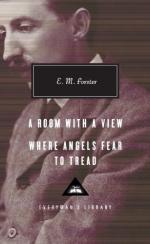“Handkerchiefs and collars,” screamed Harriet, “in my inlaid box! I’ve lent you my inlaid box.”
“Good old Harry!” She kissed every one again, and there was a moment’s silence. They all smiled steadily, excepting Philip, who was choking in the fog, and old Mrs. Theobald, who had begun to cry. Miss Abbott got into the carriage. The guard himself shut the door, and told Lilia that she would be all right. Then the train moved, and they all moved with it a couple of steps, and waved their handkerchiefs, and uttered cheerful little cries. At that moment Mr. Kingcroft reappeared, carrying a footwarmer by both ends, as if it was a tea-tray. He was sorry that he was too late, and called out in a quivering voice, “Good-bye, Mrs. Charles. May you enjoy yourself, and may God bless you.”
Lilia smiled and nodded, and then the absurd position of the foot-warmer overcame her, and she began to laugh again.
“Oh, I am so sorry,” she cried back, “but you do look so funny. Oh, you all look so funny waving! Oh, pray!” And laughing helplessly, she was carried out into the fog.
“High spirits to begin so long a journey,” said Mrs. Theobald, dabbing her eyes.
Mr. Kingcroft solemnly moved his head in token of agreement. “I wish,” said he, “that Mrs. Charles had gotten the footwarmer. These London porters won’t take heed to a country chap.”
“But you did your best,” said Mrs. Herriton. “And I think it simply noble of you to have brought Mrs. Theobald all the way here on such a day as this.” Then, rather hastily, she shook hands, and left him to take Mrs. Theobald all the way back.
Sawston, her own home, was within easy reach of London, and they were not late for tea. Tea was in the dining-room, with an egg for Irma, to keep up the child’s spirits. The house seemed strangely quiet after a fortnight’s bustle, and their conversation was spasmodic and subdued. They wondered whether the travellers had got to Folkestone, whether it would be at all rough, and if so what would happen to poor Miss Abbott.
“And, Granny, when will the old ship get to Italy?” asked Irma.
“‘Grandmother,’ dear; not ‘Granny,’” said Mrs. Herriton, giving her a kiss. “And we say ‘a boat’ or ‘a steamer,’ not ‘a ship.’ Ships have sails. And mother won’t go all the way by sea. You look at the map of Europe, and you’ll see why. Harriet, take her. Go with Aunt Harriet, and she’ll show you the map.”
“Righto!” said the little girl, and dragged the reluctant Harriet into the library. Mrs. Herriton and her son were left alone. There was immediately confidence between them.
“Here beginneth the New Life,” said Philip.
“Poor child, how vulgar!” murmured Mrs. Herriton. “It’s surprising that she isn’t worse. But she has got a look of poor Charles about her.”
“And—alas, alas!—a look of old Mrs. Theobald. What appalling apparition was that! I did think the lady was bedridden as well as imbecile. Why ever did she come?”




